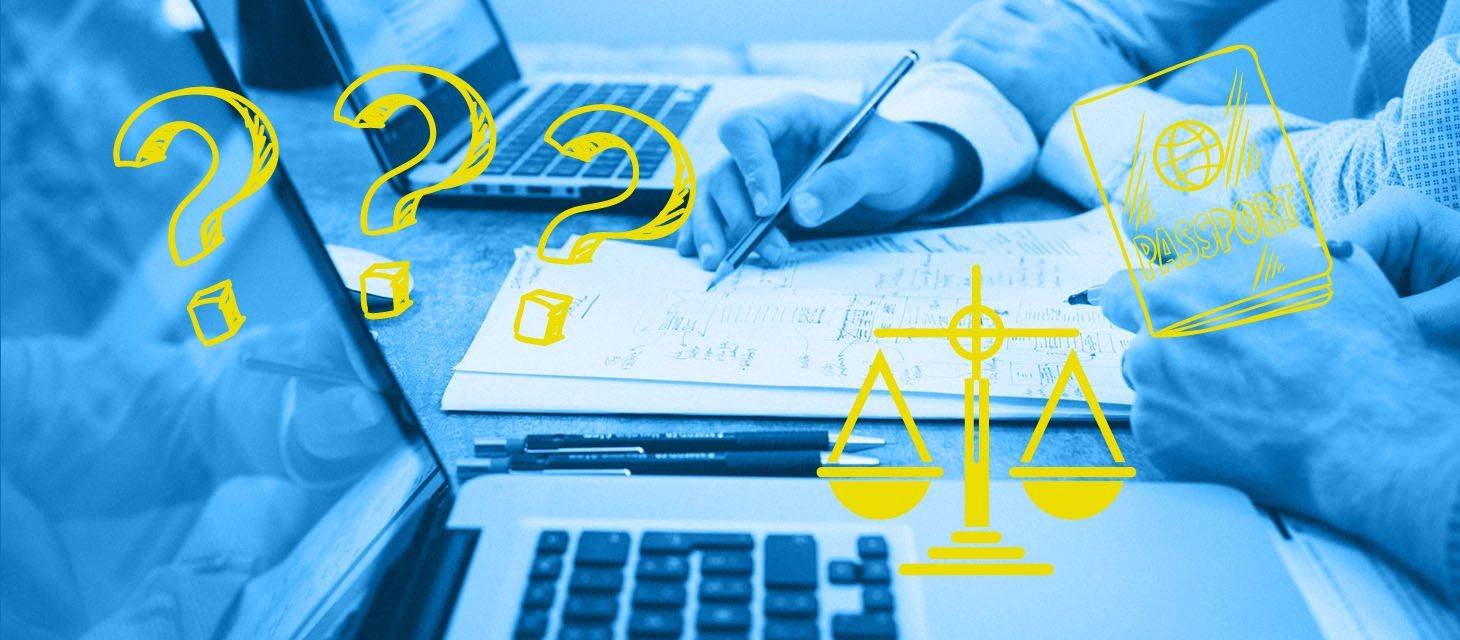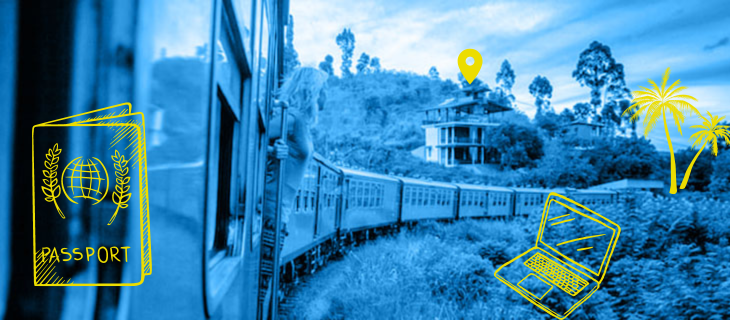Interview with Lexidy Law Firm About Portugal D7 Visa for Digital Nomads

Digital nomads have the unique opportunity to work remotely and live in Portugal with the country’s D7 visa. While this visa isn’t technically a digital nomad visa, many remote workers and passive income earners qualify for it, allowing them to live in Portugal for up to five years.
Applying for visas can be quite complicated, especially when you have to gather documents, translate them, and schedule appointments at an embassy. Navigating through bureaucracy on your own leaves too many opportunities to make mistakes and have your application rejected.
To create a smooth and stress-free process, we have partnered with Lexidy LegalTech Boutique to assist Nomads Embassy readers in submitting their Portugal visa applications and obtaining temporary residency.
We sat down with a lawyer from Lexidy to get more information about Portugal’s visas for digital nomads and how to apply for them.
How many years has your firm been in business and what do you love about your job?
Lexidy LegalTech Boutique just celebrated its 7th birthday in May 2022.
The most exciting part about my job is that we make the law simple for our clients and create a customer experience by being close to them all the way by helping with every issue that might occur in the process.
Lexidy isn’t like other law firms out there. Can you tell us a bit of background and the firm’s missions and values?
In today’s system, something is broken and knowledge about law gets monopolized by so many firms. We want to make things simple for our clients, share our expertise, and use technology in many ways to facilitate the process, even if our customer is miles away.
Is being a digital nomad legal?
Yes, of course! And the process is easier than you might think. There are three types of ways that could be taken for a Digital Nomad to apply for a residence Visa in Portugal: the Passive Income Visa (D7), the Business Visa, and the Independent Professional Visa.
At Lexidy, we can help you to figure out which option is the best one for your case.
How long can visitors stay in Portugal without a visa?
If you are a Non-EU citizen, you can stay up to 90 days in Portugal without a visa. EU citizens can stay longer than 90 days without a visa but will need to register their stay.
Portugal has a D7 visa that digital nomads are often eligible for. Can you briefly explain what this visa is?
The D7, also called Passive Income Visa, allows a Non-EU citizen to live in Portugal showing enough financial resources to support their stay. You are not allowed to conduct any type of local economic activity. The Visa is issued for four months, after that, you must apply for a residence permit that will be valid for two years.
What makes the D7 visa different from a typical “digital nomad visa?”
The main difference is that the D7 visa isn’t specifically designed for Digital Nomads. Remote workers can move and work in Portugal with a D7 Visa but, unlike other countries, it hasn’t been specially created for Digital Nomads.
What are the eligibility requirements for Portugal’s D7 visa?
As an applicant, you need to be able to prove a constant source of income – 700€/month for the applicant plus 350€/month for every additional adult family member or 235€/month for a child – to support you and your family during the stay in Portugal.
Here it is important to work with an experienced lawyer as every consulate has different requirements when they evaluate the financial situation of a person. Often it is also necessary to have the money deposited in a Portuguese account.
What is considered to be “passive income” under Portugal’s D7 visa requirements? Will I be able to work remotely from my laptop for an entity outside of Portugal and have it be considered passive income?
Passive income is typically an income that isn’t earned through professional activity. For most people, it’s an income from their pension but other common examples include investments, like dividends, and rental income.
In Portugal, however, once your proof of passive income is approved and you secure a visa, you can apply for a residency permit in Portugal. This second permit allows you to work as a freelancer in Portugal or for a company that’s not based in Portugal. This allows you to work for a company remotely from a laptop, just as long as the entity is outside of Portugal.
It also allows you to register as a non-habitual resident and be taxed at a lower flat rate.
In fact, the name passive income visa is inappropriate. The D7 became so known in English because, in the beginning, this visa was thought for retired people. The correct name of the visa would be Own Income Visa or something like that.
In other words, it is not necessary to have passive incomes to apply for a D7.
What do I have to do to apply for the Portugal D7 visa?
Like with most visas, the process starts with gathering all necessary documents. After that, you will apply at the Portuguese Embassy or Consulate of your country of residence or origin.
Once your case has been approved, you can relocate to Portugal. After your arrival, you will need to schedule an appointment to receive your Residence Permit Card.
What documents do I need to submit with my application?
Apart from showing enough financial means, you will also need private travel insurance for Portugal. Other documents required are a police clearance certificate and proof of accommodation.
What benefits come with Portugal’s D7 visa?
It lets non-EU citizens live in Portugal if their wealth can support their lifestyle. They can be allowed to work and also rely on their own income. Portuguese officials call this having sufficient economic means and the best way to show that is by having a pension.
The main applicant’s family can join them if they have enough money. They want the individual and their spouse to have enough financial resources. The visa holder and their family are also allowed to travel throughout the EU’s Schengen area without a visa.
Will visa holders owe tax while living in Portugal? Are there tax benefits or schemes they can take advantage of?
A Digital Nomad in Portugal could be subject to Portuguese Personal Income Tax. This occurs when any remote worker (i) spends more than 183 days physically in Portugal within a 12-month period, whether these days are consecutive or not (ii) for shorter stays where the person has a dwelling in Portugal and there’s the presumption of holding and occupying it as a place of habitual residence.
If one of these situations occurs, the person is considered a Portuguese Tax Resident and must declare their worldwide income, which includes remote work income.
What happens if you overstay without a visa?
The main issue is that you risk being deported. The officials can be lenient if your application for a new visa is slightly late but anyone who remains in Portugal way beyond its expiry date can face penalties such as deportation. It’s very important that you renew your visa in a timely fashion.
Can I apply for the visa without a lawyer’s assistance? What are the downfalls to this?
Yes, you can, but keep in mind that the bureaucratic effort is still quite complicated, and being abroad, finding all the right information might be tricky. You also will often need translation of the required documents and get appointments for the different governmental entities. We can assist with all of these steps and make the process a lot smoother and often faster.
Legal stuff is complicated and delicate. What would happen if I submitted the wrong document or was missing information while applying for the visa?
It would delay the process a lot. Therefore it is a very good option to work with certified lawyers as they will make sure that all is in order and you have everything you need for a successful application.
Can you tell us about the most common mistakes people make when applying for Portugal’s D7 visa on their own?
Keep in mind that being in possession of a Resident Permit, you can leave Portugal for a maximum of six months in a row or eight months during the duration of the permit. This is often overlooked when choosing this type of visa.
How long does it typically take someone to complete the process on their own?
With a lawyer the process usually takes between two and four months, depending on how long it takes the local consulate to handle the request. Whereas if you handle it without legal help, the process can be two or three times longer because there’s a higher chance that the application won’t meet the necessary standards requested by Portugal’s immigration officials.
What are the main reasons an application would be rejected?
The main reason is failing to show sufficient proof that you can financially support your lifestyle while living in Portugal. This can be a tricky hurdle to meet.
Can any lawyer help me apply for a visa or do I need a specific type? How do I choose the right professionals?
Lawyers can speed up the procedure as they have detailed information about the process and the legal jurisdictions that work fastest. Also, they can complete the forms for you and review the paperwork to see if it meets the requirements for the visa.
They also have partnerships with travel/health insurance companies, juror translators or international schools to ensure you meet some of the other requirements or just relocate in a more smooth fashion.
We recommend exploring TrustPilot or Google Reviews to verify your choice.
On average, how many days does it take for the application to be approved when digital nomads work with you?
Typically, it takes no more than two to three months with us. The main barrier is waiting for approval from the immigration authorities which can take up to 90 days. However, often it’s much quicker. Some law firms charge thousands of dollars or euros for this service, we do it faster for a fraction of that price.
How do Lexidy’s visa and immigration services work?
We are immersed in tech so rely on automation to accelerate the process. However, we’re human too and actually like speaking with people. So we maintain regular email or video call communication with clients.
Essentially, it’s a classic client-lawyer relationship where we are dedicated to delivering your dreams. We just do it quicker and faster because we live for tech solutions and innovations.
How many hours of my time will it take and how many hours will you work on my case?
We never cap our hours and don’t bill by the hour. We will work for as long as necessary to deliver a positive solution. If that means appealing and challenging the decision of the immigration officials, then so be it. You are our client and we are here to deliver.
If I decide to use your service, do I have a 100% guarantee my application will be approved?
As much as we would love to guarantee success, we cannot. There are so many variables that no one absolutely guarantees a positive outcome. However, if we feel your application is questionable or at risk we will advise you beforehand. No one likes disappointment but we will work tirelessly to deliver success.
What is the best way for digital nomads to contact you and take advantage of your assistance to apply for Portugal’s D7 visa?
If you are interested in our services to apply for the D7 visa please complete the form in this article. We will be in touch via email shortly to schedule a consultation and get started on the visa application process.
You may also enjoy

A new digital nomad visa has popped up for remote workers… but it’s not like traditional remote worker visas we’ve talked about before. Launched in February 2026, the Bhutan digital…
by Brittany

Do you dream of living and working remotely from Sri Lanka for a year? See if you can with our free Sri Lanka digital nomad visa eligibility check! Simply answer…
by Brittany

Are you planning to apply for the Portugal digital nomad visa? Then you’ll want to read about the new eligibility changes and Portugal digital nomad visa updates for 2026. Each…
by Brittany

